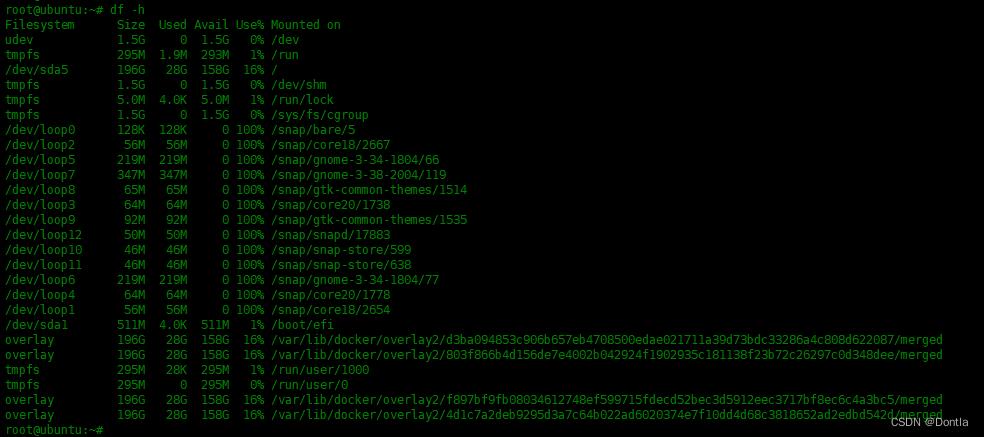vsftpd服务器不支持软连接?但是支持本机不同目录挂载?(貌似支持软连接)
Posted Dontla
tags:
篇首语:本文由小常识网(cha138.com)小编为大家整理,主要介绍了vsftpd服务器不支持软连接?但是支持本机不同目录挂载?(貌似支持软连接)相关的知识,希望对你有一定的参考价值。
ps. 谁说不支持软连接啊,我测试过支持软连接啊,vsftpd能把文件上传到一个软连接目录下,下载没测试
以下为转载内容:
vsftpd本身不支持软连接,而在用FTP共享的时候又不想移动文件位置,便在网上找到了一个workaround:
Linux内核从2.4.0开始支持把一部分文件系统挂载到文件系统中的其他位置,mount命令的--bind选项正好提供了这个功能。通过命令
mount --bind "/path/to/share" "/path/of/ftp/subpath"
可以把需要共享的文件夹“/path/to/share”挂载到FTP目录中的一个子目录上“/path/of/ftp/subpath”。这个目录对于vsftpd而言是一个正常文件系统的目录,于是就可以被共享了。当不需要共享目录时,直接umount即可,就使用而言,不比link麻烦多少。
“mount --bind”命令本身支持单个文件的挂载,可以把目标文件挂载到另外一个文件上,起到类似于软链接的功能。同目录的挂载类似,这也是vsftpd支持的。
综上,可以说除了需要权限外,使用mount已经可以解决vsftpd不支持软链接的问题了
mount和umount命令的帮助提示
mount
root@ubuntu:/home/ftp/ky# mount -h
Usage:
mount [-lhV]
mount -a [options]
mount [options] [--source] <source> | [--target] <directory>
mount [options] <source> <directory>
mount <operation> <mountpoint> [<target>]
Mount a filesystem.
Options:
-a, --all mount all filesystems mentioned in fstab
-c, --no-canonicalize don't canonicalize paths
-f, --fake dry run; skip the mount(2) syscall
-F, --fork fork off for each device (use with -a)
-T, --fstab <path> alternative file to /etc/fstab
-i, --internal-only don't call the mount.<type> helpers
-l, --show-labels show also filesystem labels
-n, --no-mtab don't write to /etc/mtab
--options-mode <mode>
what to do with options loaded from fstab
--options-source <source>
mount options source
--options-source-force
force use of options from fstab/mtab
-o, --options <list> comma-separated list of mount options
-O, --test-opts <list> limit the set of filesystems (use with -a)
-r, --read-only mount the filesystem read-only (same as -o ro)
-t, --types <list> limit the set of filesystem types
--source <src> explicitly specifies source (path, label, uuid)
--target <target> explicitly specifies mountpoint
-v, --verbose say what is being done
-w, --rw, --read-write mount the filesystem read-write (default)
-N, --namespace <ns> perform mount in another namespace
-h, --help display this help
-V, --version display version
Source:
-L, --label <label> synonym for LABEL=<label>
-U, --uuid <uuid> synonym for UUID=<uuid>
LABEL=<label> specifies device by filesystem label
UUID=<uuid> specifies device by filesystem UUID
PARTLABEL=<label> specifies device by partition label
PARTUUID=<uuid> specifies device by partition UUID
<device> specifies device by path
<directory> mountpoint for bind mounts (see --bind/rbind)
<file> regular file for loopdev setup
Operations:
-B, --bind mount a subtree somewhere else (same as -o bind)
-M, --move move a subtree to some other place
-R, --rbind mount a subtree and all submounts somewhere else
--make-shared mark a subtree as shared
--make-slave mark a subtree as slave
--make-private mark a subtree as private
--make-unbindable mark a subtree as unbindable
--make-rshared recursively mark a whole subtree as shared
--make-rslave recursively mark a whole subtree as slave
--make-rprivate recursively mark a whole subtree as private
--make-runbindable recursively mark a whole subtree as unbindable
For more details see mount(8).
umount
root@ubuntu:/home/ftp/ky# umount -h
Usage:
umount [-hV]
umount -a [options]
umount [options] <source> | <directory>
Unmount filesystems.
Options:
-a, --all unmount all filesystems
-A, --all-targets unmount all mountpoints for the given device in the
current namespace
-c, --no-canonicalize don't canonicalize paths
-d, --detach-loop if mounted loop device, also free this loop device
--fake dry run; skip the umount(2) syscall
-f, --force force unmount (in case of an unreachable NFS system)
-i, --internal-only don't call the umount.<type> helpers
-n, --no-mtab don't write to /etc/mtab
-l, --lazy detach the filesystem now, clean up things later
-O, --test-opts <list> limit the set of filesystems (use with -a)
-R, --recursive recursively unmount a target with all its children
-r, --read-only in case unmounting fails, try to remount read-only
-t, --types <list> limit the set of filesystem types
-v, --verbose say what is being done
-q, --quiet suppress 'not mounted' error messages
-N, --namespace <ns> perform umount in another namespace
-h, --help display this help
-V, --version display version
For more details see umount(8).
测试
查看挂载:
df -h

在CQ 119服务器上:
挂载:
# 前者是被链接者,后者是路径入口
mount --bind "/data/ky/" "/home/ftp/ky/"
取消挂载:
umount /home/ftp/ky/
测试发现,确实是可以实现同主机不同目录挂载的,挂载后,挂载入口路径下面之前的目录和文件就看不到了,直接就链到被挂载目录去了(而且看不出被挂载目录路径,不像软链接)
但是挂载后,我不知道怎么查找已挂载目录,,,,用df -h也查不到,这就有点蛋疼
以上是关于vsftpd服务器不支持软连接?但是支持本机不同目录挂载?(貌似支持软连接)的主要内容,如果未能解决你的问题,请参考以下文章